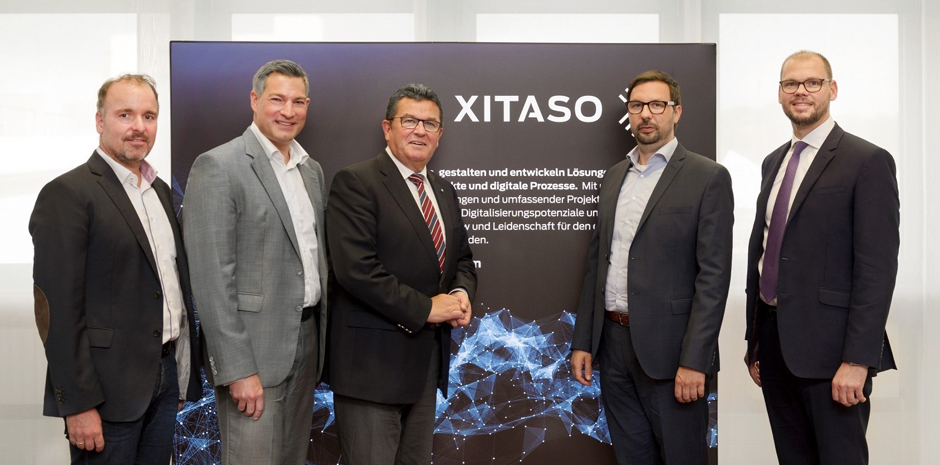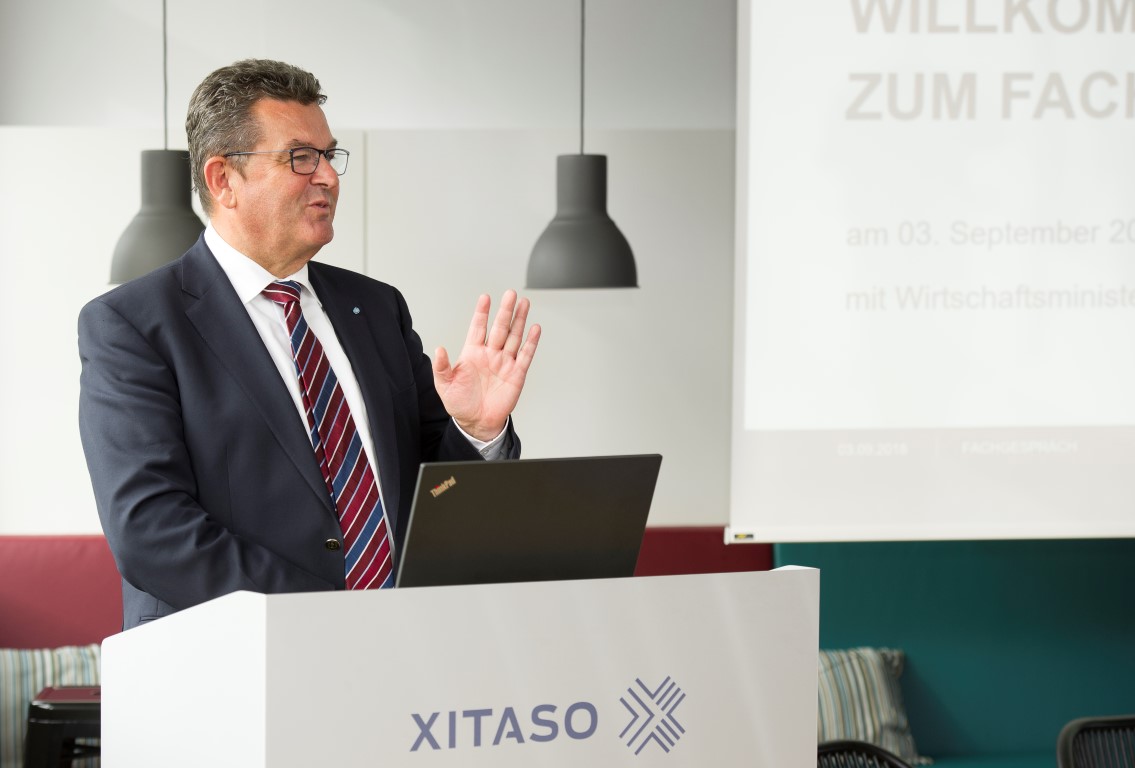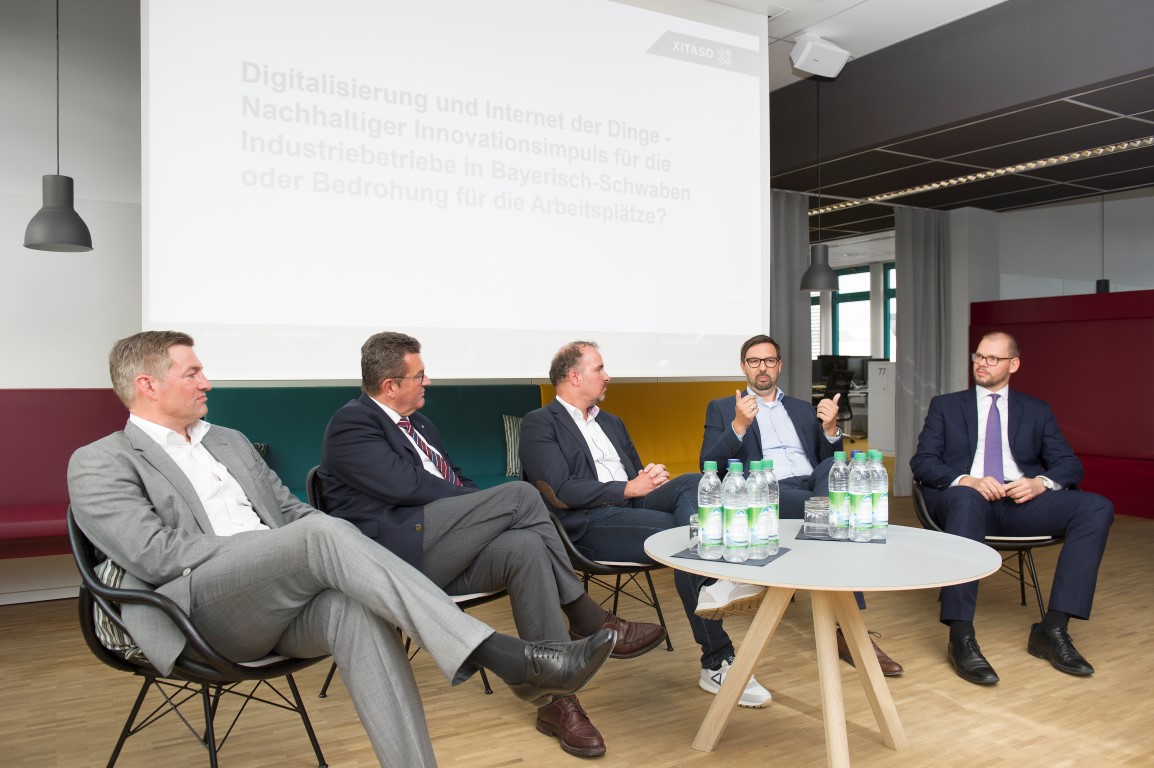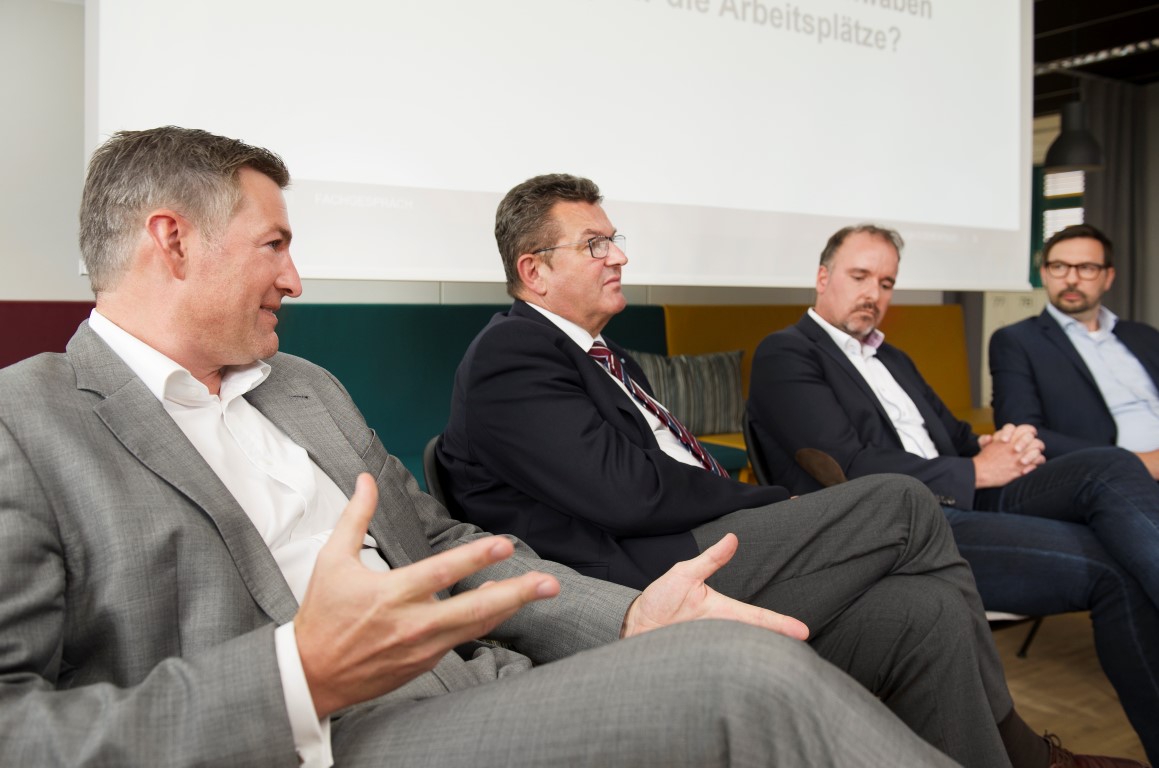
07. Sep 2018
Expert discussion with Bavarian minister of economic affairs Franz Josef Pschierer at XITASO
On September 03, 2018, the Bavarian minister of economic affairs, Franz Josef Pschierer, visited XITASO. A panel of experts discussed digitization in the region.
Augsburg and Swabia are successful economic locations with a long industrial tradition. Will the current phase of digitization enable this tradition to continue and further strengthen the location; or will it endanger workplaces and increase cyber risks? Under the motto of “Digitization: Sustainable innovative impulse or threat to work places?” the Bavarian minister of economic affairs Franz Josef Pschierer held a discussion on September 3rd with representatives from the worlds of economy, business development and science, in Augsburg. The experts came to the following conclusion: through the tight integration of science and economy, the Augsburg region finds itself in an excellent baseline position to establish itself as an innovative location in the digital era.
The event took place in the premises of XITASO, the Augsburg IT and Consultancy specialists, who support their customers in every facet of digital transformation. Among the discussion partners of the Bavarian minister of economics were Manuel Kosok, VP Technology & Development manroland Goss web systems, Stefan Schimpfle, Managing Director Digitales Zentrum Schwaben (DZ.S), Prof. Dr. Jens Brunner, Professor “Health Care Operations/Health Information Management” of the Faculty of economics at Augsburg University, as well as Ulrich Huggenberger, Managing Partner of XITASO GmbH.
Three aspects in particular were at the center of attention during the expert discussion on digitization in the regions of Augsburg and Bavarian Swabia: What is the status quo for regional companies regarding the formulation and implementation of their digital strategy? What opportunities and risks are inherent in the new technologies? And how can the economy avoid that digitization becomes a Jobkiller?
Digitization: Converging technologies and other processes

Not all of the fundamental technologies underlying digitization are new, in fact some of the major topics like machine learning or artificial intelligence are based, at least partly, on algorithms which were already being taught in Universities twenty or even thirty years ago. But it is only today, with increased performance of devices and the appropriate infrastructure, that the basis has been created for deep impacting changes and further development.
While many companies in Augsburg and Swabia had already networked their machines in the past, it was only when the first high level broadband became available that the basis was achieved for real automation, as emphasized by Ulrich Huggenberger, Managing Director of XITASO and host of the expert discussion. “Digitization requires, amongst others, the adaptation of the existing business processes in order to be really able to exploit the potential of the new technologies. We are also seeing positive examples here: Companies who are currently re-thinking their processes and defining them anew.”
Lay more emphasis on training and further education

Such deep impacting changes are naturally met with stiff opposition within companies, which is why it is vital to see digitization as a company-wide project, according to Manuel Kosok from manroland Goss web systems. “The average age of our employees is 52. Many of them have been with the company for twenty years and more. In order that digitization can be successful, these people must be incorporated into the change process.” A Cultural Change within the company is therefore one of the central steps. It has to be brought across to the employees why it makes sense and is important at the age of 52, to learn new technologies and methods like agile working, for instance.
This is the background which means training and further education measures will rise in significance, explains the Bavarian minister of economic affairs, Franz Josef Pschierer: “In the course of digitization, I expect less to see a reduction in jobs, but rather much more to see positions being moved to other operational areas. Even though the requirements for manual work processes is receding, thanks to automation and intelligent machines, other doors are being opened into completely new areas of work. But, the employees must be trained and attain qualifications.” In order to support this he sees a requirement for political action, amongst other factors: Alongside support for trainers and further education provision, the equipment in vocational schools has to be improved, in order to deal with the new challenges.
Support for new degree courses is also an important aspect in this regard, as Prof. Dr. Jens Brunner from the University of Augsburg emphasizes. “What we will see a lot less of in the future, is a person who learns a profession and works in this field for their entire life. The employee of the future will have to be a lot more flexible. And the Faculty of economics at Augsburg University is supporting this need with an appropriate provision of courses.” Specialized Clusters, particularly in the area of Operations & Information Management, are covering all current research topics in the Analytics sector and these are being integrated into the courses. This is how we form the basis for the implementation of our knowledge into practice, through Start-ups, for example.
Innovative Projects in the Region benefit the location

“With the background of the current lack of trained personnel one would assume that there is barely any flourishing Start-up scene as trained personnel will simply be soaked up by the market,” continues DZ.S Managing Director Stefan Schimpfle. “But this is simply not the case. It has never been as easy as it is today to set up a company based on a good idea.” The experts see, particularly in Augsburg, an innovative environment for entrepreneurs: “Especially in the field of Artificial Intelligence, a lot is happening in Augsburg, not least thanks to the tight connection between economy and science. I also see the sector of medical technology as being a future factor for the Augsburg location.”
This is an aspect which Franz Josef Pschierer agrees with. He mentions the new University Clinic in Augsburg as an example. Through its linkage of science and practice with the most modern technology, it represents a most positive synergy for the region, through which Augsburg can become a pioneer in the medical technology sector, perhaps through the annoynimized analysis and evaluation of patient data with digital technologies. Pschierer summarizes: “I see a wonderful opportunity for Augsburg, to profile itself as an innovative location in the sector of digitization, also when compared with other metropolitan regions.”
